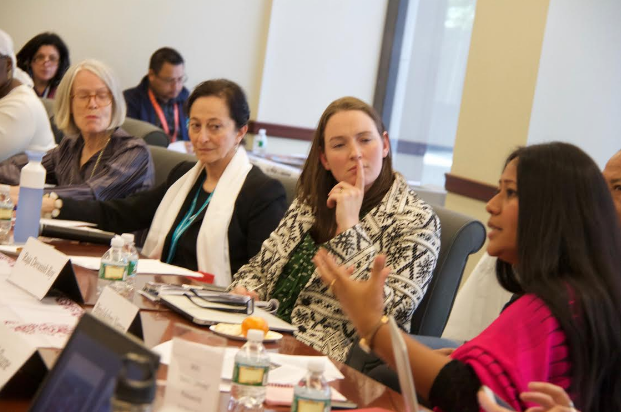Event Summary: "Indigenous Women at the Forefront of a Strong Global Nonviolent, Peace. Security and Disarmament Movement"
By Joanna Lockspeiser
Marina Butler (centre) at the event. (Photo: Marina Kumskova.)
On 18 May 2016, WILPF co-sponsored an event with the Manipur Women Gun Survivor Network and the Control Arms Foundation of India (CAFI). The speakers included Maria Butler, WILPF Global Programmes Director; Raja Devasish Roy, Member of the UN Permanent Forum on Indigenous People; Martha Saxton, Professor of History and Sexuality, Women's and Gender Studies at Amherst College; Elsa Stamatopoulou, Professor at Columbia University and Director of Indigenous Peoples’ Rights Program; and Binalakshmi Nepram, Founder of Manipur Women Gun Survivors Network & Control Arms Foundation of India.
The discussion centered around possibilities for linking the Women, Peace and Security (WPS) movement and the indigenous rights movements together. The panel addressed challenges and historical connections put forth recommendations for future work. Nepram spoke of her work with the Manipur Women Gun Survivors Network, and more broadly of the struggle faced by the women of Manipur, a state in northeastern India. She introduced the audience to the concept of “household disarmament,” in which the women of the community keep weapons out of their houses. “We the women know where the weapons are and know what it means to disarm a society,” she said.
Ms Nepram and Ms Stamatopoulou called for further integrated work between the women’s peace movement and the indigenous people’s movement. As Ms Stamatopoulou pointed out, more work at the nexus of these movements would be “a powerful step.” Ms Nepram also spoke of how non-violent protest can be more powerful and frightening to the powers-that-be than violence. “A gun in a crutch, not a sign of strength,” she declared. “When unarmed people rise up is when the world starts to get afraid.”
Read the full event summary here.

